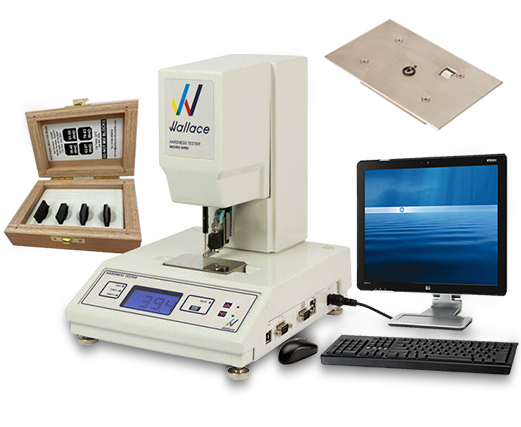
Four models of the H12 are offered
H12/1, the basic model
H12/2, printer model
H12/3, data input terminal and printer model
H12/PC, PC controlled model
The H12 Micro Hardness Tester is available in four different models. The design, the result of considerable consultation with customers, is robust and constructed from aluminium castings which with anti- vibration feet results in exceptional stability.
A major feature of the design is the ease of access in the sample area. A range of Quick Change Tables has been designed to locate different sample cross sections or to locate special jigs and fixtures. After pressing the start button the Micro Hardness Tester operates completely automatically. The result is held on the display at the conclusion of each test.
All versions conform to many National and International Standards.
See the table below for a run-down of this product’s specifications.
|
Dimensions: |
214mm (w) x 255 (d) x 300 (h) |
|
Weight: |
7.5kg including power supply |
|
Resolution: |
Better than 0.2 IRHD |
|
Indentor: |
0.395mm diameter ball |
|
Standard Test Time: |
Primary Load 5 sec; Secondary load 30 sec |
|
Standards: |
BS 903: Part A26 |
|
Sample thickness: |
2.0 ± 0.5mm |
|
Software Requirements: |
IBM compatible 486 or better. Minimum 4MB RAM. Windows 3.1 or higher. VGA or comaptible graphics card at 600 x 800 resolution. 3MB of hard disk space is required for the program to install and run properly. (Software will not run on Microsoft operating systems after Windows 98 Second Edition.) |
|
Data Terminal Dimensions: |
290 mm (w) x 150 (l) x 140(d) |
|
Weight: |
495g |
|
Printer Dimensions: |
105 mm (w) x 195 (d) x 90(h) |
|
Weight: |
625g including power supply |
Rubber Hardness Test Blocks are available in 5 scales – IRHD (Macro), IRHD (Micro), shore A, D and M. they are manufactured from high quality rubber formulated to resist the ageing effects on hardness of temperature and time. The test blocks are for use as a check to ensure instruments are functioning properly and read correctly. They are not intended as standards with specific hardness values. Test blocks should be returned to Wallace every 12 months for re-calibaration.